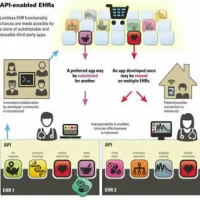The vision of the “Learning Healthcare System”, established nearly a decade ago, aims to promote a system by which research is integrated rapidly into clinical practice based on electronic health records (EHR). Supporters and critics of the vision have expressed differing opinions on its progress.
“The optimists say that patients are engaged and that data is being integrated into practice and into clinical trials,” according to Penny Mohr, MA, Senior Programme Officer, Improving Healthcare Systems, Patient-Centered Outcomes Research Institute (PCORI). “The critics say that the ‘aggregate research capacity is very thin’ and that some patients restrict access to their electronic medical records.”
The status of the Learning Healthcare System was discussed during the 20th Annual International Meeting of the International Society for Pharmacoeconomics and Outcomes Research (ISPOR). Mohr served as moderator of the first plenary session, entitled “Taking Stock of the Learning Health Care System: What Have We Achieved and Why Does it Matter?”
Sarah Greene, MPH, Associate Director, CER Methods and Infrastructure, also at PCORI, said that what was needed to build a true and rapid learning healthcare system was both ‘will and skill.’
“There is a steep hill to climb,” Greene told attendees. “We want research to add value, but the value proposition is relative. We need to consider what changes and trade-offs are needed to be able to more seamlessly integrate research and practice, and consider what those investing in such a system will get in return.”
Greene also discussed the development of PCORI’s PCORnet, a systemic network that will enable rapid, large-scale, patient-centred clinical research in the real world. “It will be the world’s first network infrastructure to be based primarily on EHR data rather than claims data,” she promised.
Regarding the Learning Healthcare System, another speaker said that the playbook is known, but there needs to be better execution. "The system might be too organisationally focused rather than network focused and building a better bridge is necessary," according to Lewis G. Sandy, MD, FACP, Senior Vice President, Clinical Advancement, United Health Group in Minneapolis. Dr. Sandy said that he liked the concept of PCORnet while advocating for better measurement alignment and clinical alignment.
Sachin H. Jain, MD, MBA, Chief Medical Officer, CareMore/Anthem and Lecturer in Healthcare Policy, Harvard Medical School, looked at the issue of building a Learning Healthcare System at two levels — the ‘change layer’ and the ‘reality level.’ “Change is often too slow,” he said, suggesting that at times where there is smoke there is no real fire below. “We need to close the gap between the possible and the actual, between best science and best practices.”
Dr. Jain concluded: “We have all the ingredients — the right policy definitions, the right technologies, and the right talent in this room — to build the Learning Healthcare System we all see as possible. But we still need to narrow the gap between the change layer and the reality layer.”
Source and image credit: ISPOR
“The optimists say that patients are engaged and that data is being integrated into practice and into clinical trials,” according to Penny Mohr, MA, Senior Programme Officer, Improving Healthcare Systems, Patient-Centered Outcomes Research Institute (PCORI). “The critics say that the ‘aggregate research capacity is very thin’ and that some patients restrict access to their electronic medical records.”
The status of the Learning Healthcare System was discussed during the 20th Annual International Meeting of the International Society for Pharmacoeconomics and Outcomes Research (ISPOR). Mohr served as moderator of the first plenary session, entitled “Taking Stock of the Learning Health Care System: What Have We Achieved and Why Does it Matter?”
Sarah Greene, MPH, Associate Director, CER Methods and Infrastructure, also at PCORI, said that what was needed to build a true and rapid learning healthcare system was both ‘will and skill.’
“There is a steep hill to climb,” Greene told attendees. “We want research to add value, but the value proposition is relative. We need to consider what changes and trade-offs are needed to be able to more seamlessly integrate research and practice, and consider what those investing in such a system will get in return.”
Greene also discussed the development of PCORI’s PCORnet, a systemic network that will enable rapid, large-scale, patient-centred clinical research in the real world. “It will be the world’s first network infrastructure to be based primarily on EHR data rather than claims data,” she promised.
Regarding the Learning Healthcare System, another speaker said that the playbook is known, but there needs to be better execution. "The system might be too organisationally focused rather than network focused and building a better bridge is necessary," according to Lewis G. Sandy, MD, FACP, Senior Vice President, Clinical Advancement, United Health Group in Minneapolis. Dr. Sandy said that he liked the concept of PCORnet while advocating for better measurement alignment and clinical alignment.
Sachin H. Jain, MD, MBA, Chief Medical Officer, CareMore/Anthem and Lecturer in Healthcare Policy, Harvard Medical School, looked at the issue of building a Learning Healthcare System at two levels — the ‘change layer’ and the ‘reality level.’ “Change is often too slow,” he said, suggesting that at times where there is smoke there is no real fire below. “We need to close the gap between the possible and the actual, between best science and best practices.”
Dr. Jain concluded: “We have all the ingredients — the right policy definitions, the right technologies, and the right talent in this room — to build the Learning Healthcare System we all see as possible. But we still need to narrow the gap between the change layer and the reality layer.”
Source and image credit: ISPOR
Latest Articles
healthmanagement, learning healthcare system, EHR, electronic health records, clinical research, patient-centred
Supporters and critics of the Learning Healthcare System have expressed differing opinions on its progress.










